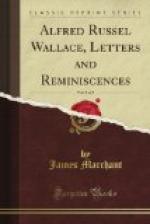There was one admission in your letter I was very sorry to see, because it cannot be strictly true, and is besides open to much misrepresentation. I mean the admission that Romanes pounces upon in his second paragraph. Of course, the number of individuals in a species being finite, the chance of four coincident variations occurring in any one individual—each such variation being separately very common—cannot be anything like “infinity to one.” Why, then, do you concede it most fully?—the result being that Romanes takes you to concede that it is infinity to one against the coincident variations occurring in “any individuals.” Surely, with the facts of coincident independent variation we now possess, the occurrence of three, four, or five, coincident variations cannot be otherwise than frequent. As a fact, more than half the whole population of most species seems to vary to a perceptible and measurable, and therefore sufficient, amount in scores of ways. Take a species with a million pairs of individuals—half of these vary sufficiently, either + or -, in the four acquired characters A, B, C, D: what will be the proportion of individuals that vary + in these four characters according to the law of averages? Will it not be about 1 in 64? If so it is ample—in many cases—for Natural Selection to work on, because in many cases less than 1/64 of offspring survives.
On Romanes’ view of the impossibility of Natural Selection doing anything alone, because the required coincident variations do not occur, the occurrence of a “strong man” or a racehorse that beats all others easily must be impossible, since in each of these cases there must be scores of coincident favourable variations.
Given sufficient variation, I believe divergent modification of a species in two lines could easily occur, even if free intercrossing occurred, because, the numbers varying being a large proportion of the whole, the numbers which bred like with like would he sufficient to carry on the two lines of divergence, those that intercrossed and produced less perfectly adapted offspring being eliminated. Of course some amount of segregate breeding does always occur, as Darwin always maintained, but, as he also maintained, it is not absolutely essential to evolution. Romanes argues as if “free intercrossing” meant that none would pair like with like! I hope you will have another slap at him, and withdraw or explain that unlucky “infinity to one,” which is Romanes’ sheet-anchor.—Yours very truly,
ALFRED R. WALLACE.
* * * * *
TO PROF. POULTON
Parkstone, Dorset. June 16, 1892.




